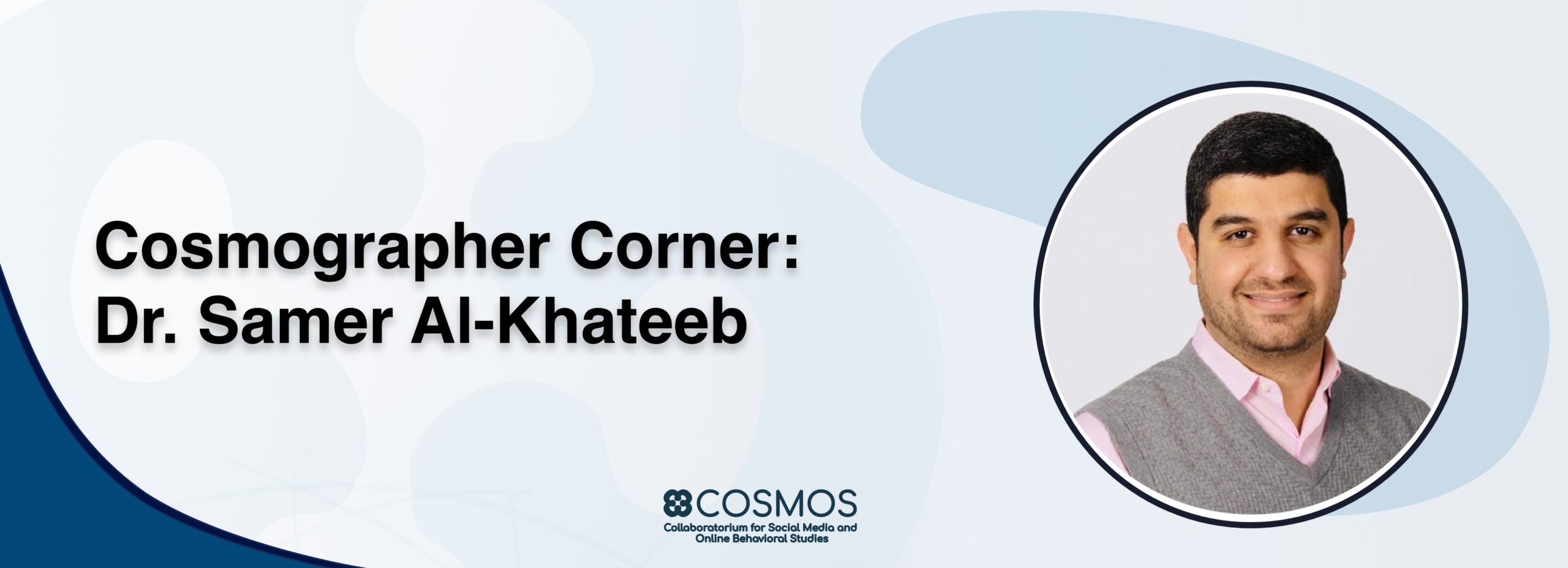COSMOS, in this edition of Cosmographer Corner, highlights the work of a former University of Arkansas – Little Rock graduate and Cosmographer Dr. Samer Al-Khateeb. Dr. Al-Khateeb—who is now a tenured associate professor at Creighton University, in Omaha, Nebraska—started his graduate education as a COSMOS researcher during its inception. He received his BS in Computer Science, MS in Applied Science, and Ph.D in Computer and Information Sciences from UA Little Rock in 2013, 2015, and 2018, respectively. During that time, Dr. Al-Khateeb worked at COSMOS as a graduate assistant, and after receiving his Ph.D, he worked at COSMOS as a postdoctoral fellow. We interviewed Dr. Al-Khateeb on where his career is now and what his work at COSMOS entailed, with his responses below.
How long were you at COSMOS? How did you come across COSMOS originally, and what drew you to the team?
I finished my undergraduate degree in Computer Science at University of Arkansas at Little Rock in Spring 2013. I took Dr. Agarwal’s Social Computing class during my first semester as a graduate student. He showed us his work on the Saudi Women’s Right to Drive campaign, and I loved the project. So, I reached out to him when I was looking for a research advisor for my Master’s degree, and he shared a set of articles and his research proposal on mob behavior. He was planning to submit it to the U.S. Army Research Office at that time. I loved the project idea, and I decided to work on it.
For your work on mob behavior, what did that entail? What did you get out of it?
So, I spent more than five years working with Dr. Agarwal during my time at University of Arkansas at Little Rock. During these five years, even before COSMOS existed, I worked on various projects. I started with the mob project, but then I also moved on to a social bots project, and also worked on analyzing disinformation/misinformation campaigns during various military exercises. Additionally, I analyzed blog sites using the BlogTracker tool and utilized social cyber forensics to study cross-media coordination. As I was leaving COSMOS to join Creighton University, we began work on the YouTubeTracker tool. I still consider myself as working with COSMOS, as I am currently collaborating with Dr. Agarwal and graduate students at COSMOS on creating a simulation model of mobs, leveraging various social science theories.
Outside your research, what else were you able to accomplish while at COSMOS?
The most momentous event as a graduate student was when my first conference paper was accepted,which I then presented at Yale University. I learned a lot during that conference and realized that the work I am doing is significant and has a meaningful impact; I began to feel like what I’m doing is having an effect on society.
Since leaving COSMOS, what kinds of work have you done? What is your current work? What positions did COSMOS and your classes at UALR best prepare you for?
After leaving COSMOS, I joined Creighton University as an assistant professor in the Department of Computer Science, Design, and Journalism, where I primarily teach undergraduate students. I was recently promoted to associate professor and granted tenure.
I gained invaluable experience from my time at COSMOS, particularly in teamwork, which has greatly benefited me in my role as a teacher.
For instance, most of my upper-level classes involve project-based learning, where I encourage students to start their projects early, establish milestones throughout the semester, and encourage students to collaborate with each other to ensure timely project completion. Regarding teaching, I developed a course titled Social Networks Analytics, in which I teach my students the knowledge and skills I acquired during my time at COSMOS and beyond. Also, my postdoctoral experience at COSMOS equipped me with the ability to manage multiple projects and supervise students engaged in these projects. This expertise has been instrumental in overseeing my research endeavors at Creighton University and has provided me with the necessary skills to work with my research assistants and teaching assistants effectively.
What would be your advice for people at COSMOS and UALR now?
My advice to students at COSMOS is to keep going and never give up. Consistency is key to success. Do not be afraid to take on new projects or learn new skills; these will be the building blocks of your future career, but stay focused on your projects, too. Even if you feel like things are not paying off at the moment, they will pay off in the future. Finally, try to publish your research diligently to contribute to the scientific community, but do not forget to have fun and take care of yourself.

